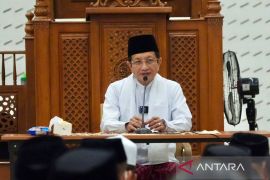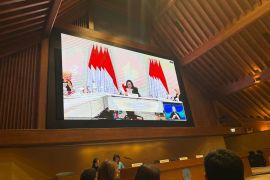"The primary deficit will be kept down to less than Rp100 trillion as of 2018, so that it will move in a positive direction," Finance Minister Sri Mulyani Indrawati said.Jakarta (ANTARA News) - The Indonesian government will make every effort to cut the primary deficit in 2018 to less than Rp100 trillion, or -0.6 percent to -0.4 percent, of the national gross domestic product, Finance Minister Sri Mulyani Indrawati said.
"The primary deficit will be kept down to less than Rp100 trillion as of 2018, so that it will move in a positive direction," the minister said, in a working meeting with the House of Representatives (DPR)s Commission XI to discuss basic assumptions in the budget year 2018, here on Monday.
"The primary balance will be encouraged to move in a positive direction by increasing the tax ratio and using the non-priority budget fund efficiently," she stated.
The other efforts to maintain fiscal continuity are maintaining budget deficit and ratio of debts to GDP at safe limit, so that it will fall in the medium run, she noted.
The government noted that the primary deficit continued to fall from 1.23 percent in 2015 to 0.8 percent in 2017.
Primary deficit refers to the difference between fiscal deficit of the current year and interest payments on the previous borrowings.
According to the projection, if the primary balance reaches zero percent, it means that the government will no longer issue debt securities to pay debt interest in 2021.
Director General of Budget at the Finance Ministry Askolani remarked that the primary balance may reach zero percent if the budget deficit stands at 1.1 percent to 1.2 percent of the GDP.
"We have once made the assessment that it will come close to zero (percent) if the (budget) deficit is 1.1 percent to 1.2 percent," Askolani revealed.
But he could not ascertain whether the primary balance will reach zero percent in 2019 as the government still sets the budget deficit for 2018 at a range of between 1.9 percent and 2.3 percent.
Overall, the performance of the primary deficit is highly dependent on the realization of tax receipts and the evaluation of subsidy policy, he noted.
"To achieve it, the tax ratio must increase significantly; for instance to 12 percent, which will be able to cut deficit. We want it to reach 13-14 percent; but based on the evaluation, it is still difficult to achieve that," he explained. (*)
Editor: Heru Purwanto
Copyright © ANTARA 2017











